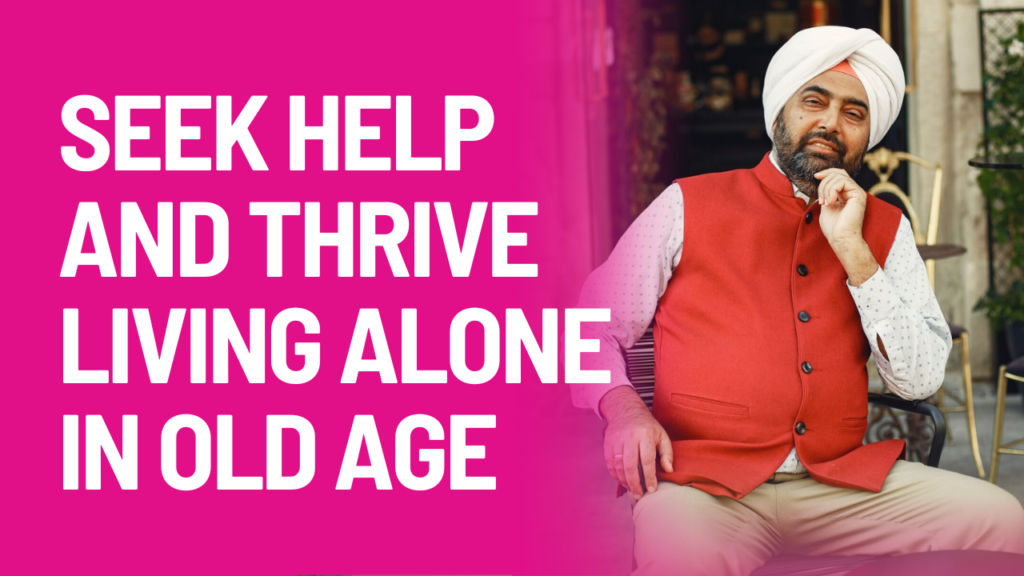Living alone in your elderly age can be both a source of pride and an opportunity for reflection. After years of taking care of others—children, spouses, maybe even parents—you’ve earned the right to enjoy your own space and live life on your terms. But with that independence comes a responsibility to yourself, and it’s important to balance freedom with self-awareness, especially as your needs evolve.
In this new chapter, many older adults face the challenge of acknowledging when it’s time to seek a little help, and that’s okay. In fact, recognizing your limits is a sign of strength, not weakness.
The Joy of Independence: Rediscovering Yourself
Living alone can be empowering, offering a chance to rediscover hobbies, interests, and passions that may have been set aside during the busier years of life. Whether it’s curling up with a good book, painting, gardening, or even trying out that yoga class you’ve always been curious about, this is your time to enjoy the freedom of active aging.
One of the best parts of living independently is the ability to set your own schedule. Want to have breakfast at noon? Go for it! Want to binge-watch your favorite shows or take up knitting again? Absolutely. Living alone gives you the space to focus on your needs, explore new routines, and embrace healthy aging in your own unique way.
But with independence, there can sometimes be a catch: the challenge of managing your changing health needs and recognizing when a little extra help might be necessary.
Practical Example: Meet Joan, the Independent Spirit
Take Joan, a 72-year-old with a zest for life. Joan moved into her own apartment after her husband passed away and quickly fell in love with her newfound freedom. She filled her days with gardening, walking around her neighborhood, and trying her hand at painting—a passion she hadn’t explored since her younger years.
Joan’s story is a great example of active aging. She took charge of her health, exercised regularly, and ate a balanced diet. But even though Joan was thriving in many ways, she began to notice a few subtle changes. She occasionally forgot where she left her keys, struggled to open stubborn jars, and found herself feeling more tired after long walks.
At first, Joan brushed these changes off as just part of growing older. After all, she was in good health and felt confident in her independence. But over time, she realized that acknowledging her limits didn’t make her any less independent; it made her more aware of her well-being.
Joan decided to reach out to a local service that provided occasional help with household chores. It was a simple, practical step that allowed her to continue living independently while getting the support she needed for daily tasks that had become a bit more challenging.
Recognizing When It’s Time to Ask for Help
Just like Joan, many old age people can benefit from recognizing when it’s time to seek help—whether it’s for physical tasks, healthcare needs, or simply having someone to check in with. As we grow older, our bodies change, and with those changes come new challenges. That’s where the concept of healthy aging comes into play: actively taking care of ourselves and being mindful of our evolving needs.
Asking for help doesn’t mean you’re giving up your independence; it means you’re taking charge of your aging and health. Whether you need help with small household tasks, transportation, or even managing medications, there are resources available to ensure that you stay safe, healthy, and happy.
A Balancing Act: Independence and Support
Living alone as an older adult can sometimes bring up feelings of isolation or anxiety. Anxiety in old age is a common concern, especially when managing the responsibilities of daily life on your own. It’s important to balance the desire for independence with the reality of aging and health. Remember, seeking help doesn’t diminish your freedom—it enhances it by ensuring you have the tools and support you need to continue living life fully.
If you start to feel anxious or overwhelmed, don’t hesitate to reach out to family members, friends, or professionals. Sometimes, having a regular conversation with someone who cares can make all the difference in maintaining emotional well-being. You don’t have to go through it alone.
Embracing Help as Part of Independence
One of the greatest misconceptions about growing older is that asking for help equates to losing independence. But this couldn’t be further from the truth. In reality, accepting help is one of the smartest ways to ensure that you can continue living independently for as long as possible. Whether it’s hiring someone to help with household chores, seeking medical advice, or simply having a neighbor check in on you, these small steps can provide peace of mind and allow you to focus on the things you love most.
You’re still in charge of your life, your decisions, and your daily activities—asking for help just means you’re smart enough to know when you need a little extra support.
Practical Tips for Embracing Help While Living Alone
- Start Small: Like Joan, begin by reaching out for help with small tasks, such as grocery shopping or yard work. These are manageable ways to introduce assistance without feeling overwhelmed.
- Create a Support Network: Build a circle of friends, neighbors, or family members who can check in on you regularly. This network can provide both emotional and practical support.
- Use Technology: There are plenty of apps and services designed to help older adults age independently. From medication reminders to grocery delivery, technology can make it easier to manage your needs while maintaining independence.
- Listen to Your Body: As you grow older, pay attention to the signals your body is sending you. If certain tasks are becoming difficult, it’s time to consider getting some help. It’s not a failure; it’s a sign of healthy aging.
The Light-Hearted Side of It All: Help Can Be Fun!
We often think of asking for help as something serious, but it doesn’t have to be. Imagine this: you hire someone to help you around the house, and they bring along their adorable dog. Suddenly, the tasks that seemed overwhelming turn into a fun visit with a furry friend! Or perhaps you invite a friend over to help you with a project and end up reminiscing about old times while getting the job done. Help doesn’t have to be dull; it can lead to new connections and even a little laughter along the way.
At CanDoAge, we believe that active aging is about finding the perfect balance between independence and support. Living alone in your older adults age doesn’t mean you’re alone in your journey. Embrace your independence, but also recognize that it’s okay to ask for help when you need it. It’s not about giving up control; it’s about taking control of your life and ensuring that you have the resources to thrive in this new chapter.
So, take a moment to assess your needs. Is there a task you’re finding a little more challenging these days? Are you feeling more tired or anxious? If so, reach out to someone who can lend a hand. Remember, CanDoAge is here to remind you that you’re not alone, and there’s strength in knowing when to ask for support.
Embrace the freedom that comes with living alone, but don’t hesitate to lean on others when necessary. You’ve earned the right to live life on your terms—just make sure those terms include a little help when needed. Your future self will thank you!

